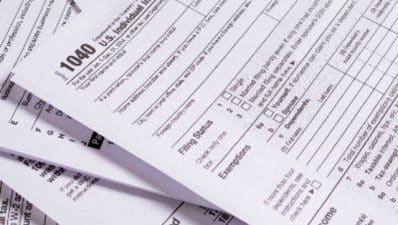
Tax Day is April 18, 2023 and 73 percent of taxpayers think the government does not use their taxes wisely.
WalletHub released its report on the states with the Best & Worst Taxpayer Return on Investment in 2023.
The personal finance website used 29 metrics to compare the quality and efficiency of state government services across five categories: education, health, safety, economy and infrastructure & pollution. The different rates residents are taxed in each state was taken in account.
Virginia is no. 7 for overall return on investment for taxpayers. Virginia is ranked second best for economy, fourth for education, and eighth when it comes to infrastructure and pollution.
New Hampshire residents get the best return on their investment of state and local taxes, followed by Florida, Alaska, South Dakota and Texas.
Providing the worst return on investment for taxpayers is California, followed by Hawaii, New Mexico, Arkansas and Delaware.
According to Nicholas Robinson, Director of Accountancy and Assistant Chair of Accounting and Law, Finance and BAIS at Eastern Illinois University, states with higher taxes typically provide more government services, but determining if the services are better is difficult.
“There is always an opportunity cost with taxes. While states with greater revenues can afford to offer more services, the taxes paid are not in the hands of the individuals to otherwise spend. The cost/benefit of this arrangement may be assessed by the choices made by taxpayers and benefit recipients. The latest census has shown that the highest tax states, California, New York, and Illinois, have all seen massive population exodus. The states that have grown the most, Florida and Texas, do not have an income tax. The benefits or detriments of being in a high-tax state versus a low-tax state could be assessed by the population voting with its feet,” Robinson said.
Dr. Mitchell Franklin, an associate professor at Le Moyne College, said that his observations conclude that states with higher taxes do not provide better services.
“They collect more revenues, but often the political policies and ‘red tape’ these states have make them less efficient than other states. They collect more, but spend it in a way that many would say is less efficient than others who have less to work with, often driven by political beliefs,” Franklin said.
Dr. Stephen J. Lusch, an associate professor at Texas Christian University, said that he is pleased to see the rise of evidence-based budgeting in state and local governments.
“Under evidence-based budgeting, budget requests are accompanied by research to support the request. That is, a budget manager cannot simply request a 10 percent increase in her budget for the year. Instead, the proposed increase would need to be accompanied by research to support the budget increase. A caveat here is that research can be cherry-picked to support nearly any position. Thus, the government also needs a process in place to ensure that as much evidence as possible, including evidence contrary to the preferred outcome, is brought to the table in the decision-making process,” Lusch said.
Franklin said states could use taxes more efficiently by keeping politics out of the equation, stopping red tape and stopping policies that encourage waste and over spending.
“This will not be popular, but political pressure plays too much of a spending role over the best business decision and leads to money being spent in the places that are not best for the area overall for long-term growth. There is economic research that shows that government is much less efficient at spending and managing programs than private industry. If they really want to maximize efficiency, privatize much of what today is government spending and provide proper incentives for private industry to have a larger role in providing services than hiring employees to carry functions in house. Of course, there is also an issue of private industry accountability when handling government money to provide services, so transparency would be very important to ensure that all parties are accountable,” Franklin said.
What are the most efficient ways for local governments to mitigate the fiscal impact of inflation?
“Inflation, from a tax revenue standpoint, is transitory. Meaning it will correct itself in a few years. As the value of a dollar deteriorates and makes everything more expensive, taxpayers will have their salaries eventually adjusted to make up for the increased costs,” Robinson said. “As taxes are paid based on percentages, when people make more money, more is paid in taxes as well. The increased revenues will cover the increased costs faced by the local government. While this may take several years to fully correct, governments should spend cautiously while they can. Spending within their means and under their revenues can build a reserve fund to cover the additional costs associated with high inflationary times. Once the revenues increase, the reserve fund can be refilled to plan for the next economic downturn. This is always a difficult situation for state and local governments as they do not have the ability to print more money like the federal government does.”










